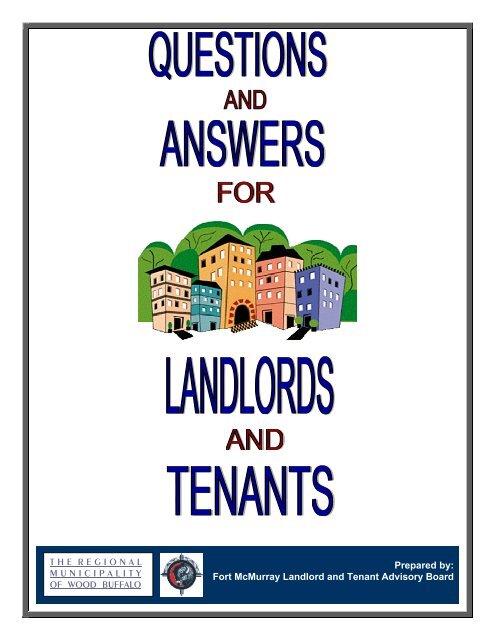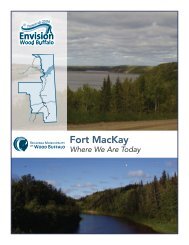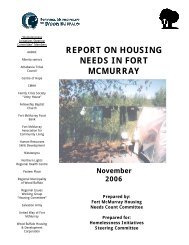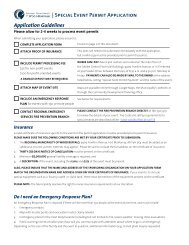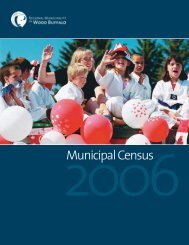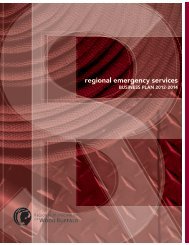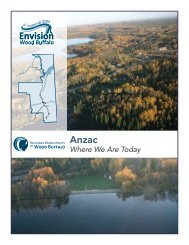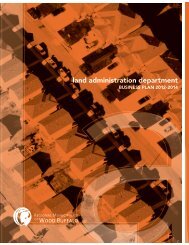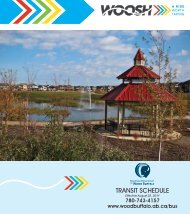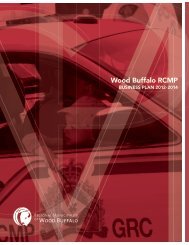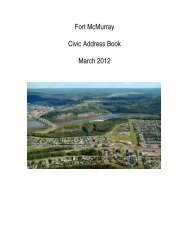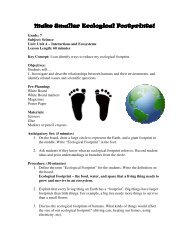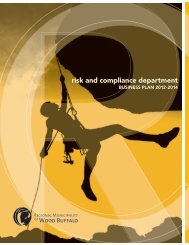Prepared by: Fort McMurray Landlord and Tenant Advisory Board ...
Prepared by: Fort McMurray Landlord and Tenant Advisory Board ...
Prepared by: Fort McMurray Landlord and Tenant Advisory Board ...
You also want an ePaper? Increase the reach of your titles
YUMPU automatically turns print PDFs into web optimized ePapers that Google loves.
T H E R E G I O N A L<br />
M U N I C I P A L I T Y<br />
OF WOOD BUFFALO<br />
<strong>Prepared</strong> <strong>by</strong>:<br />
<strong>Fort</strong> <strong>McMurray</strong> <strong>L<strong>and</strong>lord</strong> <strong>and</strong> <strong>Tenant</strong> <strong>Advisory</strong> <strong>Board</strong>
TABLE OF CONTENTS<br />
INTRODUCTION....................................................... 2<br />
RENT......................................................................... 3<br />
TENANCY AGREEMENTS........................................... 4<br />
ASSIGNMENT & SUBLEASING................................... 6<br />
ACCOMMODATION INSPECTION REPORTS.............. 6<br />
SECURITY DEPOSITS.................................................. 8<br />
RENT INCREASE...................................................... 10<br />
NOTICE OF ENTRY.................................................. 11<br />
LOCKS..................................................................... 12<br />
LANDLORD’S OBLIGATIONS................................... 12<br />
TENANT’S REMEDIES.............................................. 13<br />
TENANT’S OBLIGATIONS....................................... 13<br />
LANDLORD’S REMEDIES.......................................... 13<br />
24-HOUR NOTICE................................................... 14<br />
ABANDONED PREMISES.......................................... 15<br />
TERMINATION OF TENANCY................................. 16<br />
ROOMMATES AND GUESTS................................... 18<br />
ADDITIONAL INFORMATION................................. 20<br />
FORT MCMURRAY LANDLORD/TENANT INFO....... 21<br />
These questions <strong>and</strong> answers have been produced<br />
for information only <strong>and</strong> are not an exact statement of law.<br />
2
INTRODUCTION<br />
1. Who is a tenant?<br />
A tenant is a person who rents from a l<strong>and</strong>lord.<br />
A tenant is a person who rents from a l<strong>and</strong>lord.<br />
2. Who is a l<strong>and</strong>lord?<br />
A l<strong>and</strong>lord may be the owner of the premises or a property management company representing the owner.<br />
3. What is a <strong>L<strong>and</strong>lord</strong> <strong>and</strong> <strong>Tenant</strong> <strong>Advisory</strong> Service?<br />
A <strong>L<strong>and</strong>lord</strong> <strong>and</strong> <strong>Tenant</strong> <strong>Advisory</strong> Service is a service made up of volunteer members appointed <strong>by</strong> a city or<br />
town council in the Province of Alberta for the purpose of carrying out the following functions:<br />
a) to advise l<strong>and</strong>lords <strong>and</strong> tenants in tenancy matters,<br />
b) to receive complaints <strong>and</strong> seek to mediate disputes between l<strong>and</strong>lords <strong>and</strong> tenants,<br />
c) to distribute information for the purpose of educating <strong>and</strong> advising l<strong>and</strong>lords <strong>and</strong> tenants concerning<br />
rental practices, rights <strong>and</strong> remedies,<br />
d) to receive <strong>and</strong> investigate complaints of conduct that is against the laws governing tenancies.<br />
The day-to-day functions of providing information, mediation, dealing with disputes <strong>and</strong> investigating<br />
complaints of conduct are carried out <strong>by</strong> professional staff hired for these purposes.<br />
4. Is there anything to which the Residential Tenancies Act does not apply?<br />
The Residential Tenancies Act of Alberta does not apply to:<br />
a) a mobile home site where the tenant owns the mobile home <strong>and</strong> rents only the site (refer to the Mobile<br />
Home Sites Tenancies Act for more information),<br />
b) premises occupied for business purposes with living accommodation attached <strong>and</strong> rented under a single<br />
agreement,<br />
c) rooms in the living quarters of the l<strong>and</strong>lord, if the l<strong>and</strong>lord lives in those quarters,<br />
d) a hotel, motel, motor hotel, resort, lodge or tourist camp, a cottage or cabin located in a campground or<br />
trailer park, tourist home, bed <strong>and</strong> breakfast establishment or farm vacation home, if a person resides<br />
there for less than six consecutive months,<br />
e) a tenancy agreement between an educational institution as l<strong>and</strong>lord <strong>and</strong> a student of that institution as<br />
tenant if the tenant does not have exclusive possession of a self-contained dwelling unit,<br />
f) a nursing home as defined in the Nursing Homes Act,<br />
g) a senior citizens lodge that is operated <strong>by</strong> the Government of Alberta or <strong>by</strong> a foundation incorporated<br />
under the Senior Citizens Housing Act or <strong>by</strong> a non-profit organization under that Act,<br />
h) a social care facility licensed under the Social Care Facilities Licensing Act,<br />
i) a correctional institution,<br />
-2-
j) any other prescribed premises.<br />
5. The Act prevails:<br />
‣ Any waiver or release <strong>by</strong> a tenant as to the rights, benefits or protection under this Act is void.<br />
The Residential Tenancies Act, Residential Tenancies Ministerial Regulation, Mobile Home Sites Tenancies<br />
Act <strong>and</strong> the Subsidized Housing Act can be purchased at the Queen’s Printer bookstores in Calgary <strong>and</strong><br />
Edmonton.<br />
6. What is the Residential Tenancies Ministerial Regulation?<br />
This document is an addition to the Residential Tenancies Act containing information regarding ab<strong>and</strong>oned<br />
goods, statements that must be on inspection reports <strong>and</strong> security deposit trust accounts.<br />
7. Is the law the same in all provinces in Canada?<br />
No, the law in each province is different.<br />
RENT<br />
8. If a tenant fails to pay the rent during the winter, can an eviction<br />
notice be served?<br />
Yes, providing proper notice is given.<br />
9. Does the tenant have a grace period to pay the rent?<br />
No. Rent is due <strong>and</strong> payable on the first day of each <strong>and</strong> every tenancy month, unless otherwise stated in the<br />
rental agreement whether it is written or verbal.<br />
10. Who is responsible for paying the rent?<br />
The tenant. If more than one person signs the tenancy agreement as a tenant, the l<strong>and</strong>lord can require any one,<br />
some or all of the tenants to pay the entire rent amount.<br />
-3-
11. If a tenant does not pay the rent on or before the first of a tenancy<br />
month, can the l<strong>and</strong>lord serve the tenant with an eviction notice?<br />
Yes, with a 14 clear day notice for non-payment of rent.<br />
12. What other remedies are available to a l<strong>and</strong>lord if the rent is not<br />
paid <strong>by</strong> the tenant?<br />
The l<strong>and</strong>lord may apply to the Court for a possession of his premises. Alternatively, the l<strong>and</strong>lord can conduct a<br />
Bailiff’s office to file a “<strong>L<strong>and</strong>lord</strong>’s Distress Warrant” for the amount of rent owing. The Bailiff can then seize<br />
the belongings of the tenant.<br />
13. If a tenant expires (passes away) during the tenancy, can the<br />
l<strong>and</strong>lord hold the tenant’s estate liable for the next month’s rent?<br />
Yes, the Residential Tenancies Act states that one month’s notice must be given to the l<strong>and</strong>lord on the first day<br />
of the month provided the tenant is renting monthly from the l<strong>and</strong>lord. The definition of tenant includes the<br />
heirs of that person.<br />
TENANCY AGREEMENTS<br />
14. Does the tenancy agreement have to be in writing?<br />
No. An agreement can be written, oral or implied, however, it is preferable to have it in written form. If the<br />
agreement is in writing, it must contain the following statement in print larger than the other print in the<br />
agreement:<br />
‣ The Tenancy created <strong>by</strong> this agreement is governed <strong>by</strong> the Residential Tenancies Act of Alberta <strong>and</strong> if<br />
there is a conflict between the agreement <strong>and</strong> the Act, the Act prevails.<br />
15. What information should be contained in the tenancy agreement?<br />
The residential tenancy agreement (lease) should include the following information:<br />
a) date of agreement,<br />
b) names <strong>and</strong> addresses of both parties,<br />
c) address of property to be rented,<br />
d) term of the tenancy (start <strong>and</strong> end date for a fixed term tenancy),<br />
e) address of where tenant pays the rent,<br />
f) amount of rent to be paid,<br />
g) utilities tenant is responsible for,<br />
h) names of permitted occupants <strong>and</strong> the maximum number of occupants allowed in the suite,<br />
i) what the tenant takes care of <strong>and</strong> repairs,<br />
j) what the l<strong>and</strong>lord takes care of <strong>and</strong> repairs,<br />
-4-
k) what insurance the tenant should have,<br />
l) what insurance the l<strong>and</strong>lord has,<br />
m) other rules (building rules, pets, smoking, use of common areas etc.).<br />
16. Is there a st<strong>and</strong>ard form for a tenancy agreement?<br />
There are no st<strong>and</strong>ard forms in Alberta.<br />
‣ Forms may be purchased for the <strong>Fort</strong> <strong>McMurray</strong> <strong>L<strong>and</strong>lord</strong> <strong>and</strong> <strong>Tenant</strong> <strong>Advisory</strong> Office located in<br />
Family <strong>and</strong> Community Support Services on the 3 rd floor of City Hall.<br />
17. If there is a written tenancy agreement, must the tenant receive a<br />
copy?<br />
Yes. A l<strong>and</strong>lord must return a fully signed copy of the tenancy agreement to the tenant within 21 days after<br />
signing.<br />
18. Are there different types of tenancy agreements?<br />
Yes. There are two types of tenancy agreements:<br />
a) A fixed term tenancy is one that ends on a day specified in the agreement. No notice need be given <strong>by</strong><br />
the l<strong>and</strong>lord or tenant to terminate a fixed term tenancy, unless it includes a provision allowing for<br />
renewal or continuation without notice after the fixed term, in which case it may be terminated at the<br />
end of the fixed term or at any time thereafter as a periodic tenancy.<br />
b) A periodic tenancy is one that is renewed or continued on a periodic basis (e.g. weekly, monthly)<br />
without notice or, with respect to a fixed term tenancy that contains a provision allowing for renewal or<br />
continuation without notice, that part of the tenancy that arises after the end of the fixed term.<br />
‣ A tenancy agreement that has been signed <strong>and</strong> witnessed <strong>by</strong> the tenant <strong>and</strong> l<strong>and</strong>lord becomes a<br />
legal binding document.<br />
19. Can a l<strong>and</strong>lord refuse to rent to a potential tenant?<br />
Yes. The decision as to whom to rent to is the l<strong>and</strong>lord’s. However, according to the Individual Right Protection<br />
Act the l<strong>and</strong>lord cannot refuse to rent to someone because of their race, religion, sex, physical or mental<br />
disability, ancestry, or place of origin.<br />
-5-
ASSIGNMENT AND SUBLEASING<br />
20. Can the rented premises be subleased <strong>by</strong> the tenant?<br />
No. A tenant cannot sublease or assign without the written permission of the l<strong>and</strong>lord. After receiving a request,<br />
the l<strong>and</strong>lord has 14 days to respond. No response means that consent has been given.<br />
21. Can a l<strong>and</strong>lord charge for giving consent to an assignment or<br />
sublease?<br />
No.<br />
ACCOMMODATION INSPECTION REPORTS<br />
22. What is an accommodation inspection report?<br />
An accommodation inspection report is a written record of the condition of the premises at the beginning <strong>and</strong> at<br />
the end of a tenancy.<br />
23. Is an accommodation inspection report m<strong>and</strong>atory?<br />
Yes. The Residential Tenancies Act states that a l<strong>and</strong>lord <strong>and</strong> tenant must inspect the rental premises within one<br />
week before or after the tenant takes possession of the premises, <strong>and</strong> within one week before or after the tenant<br />
gives up possession of the premises.<br />
24. Must a l<strong>and</strong>lord give the tenant a copy of the accommodation<br />
inspection report?<br />
Yes. At the time of the move-in inspection report, <strong>and</strong> at the time of the move-out inspection.<br />
25. Does an accommodation inspection report have to be signed?<br />
Yes, it must be signed in accordance with the regulation under the Residential Tenancies Act.<br />
-6-
26. What information must the accommodation inspection report<br />
contain?<br />
The Residential Tenancies Act <strong>and</strong> Residential Tenancies Ministerial Regulations set out what must be<br />
contained in the Accommodation Inspection Report.<br />
27. What can a l<strong>and</strong>lord do if the tenant refuses to sign the<br />
accommodation inspection report?<br />
If the tenant refuses, the following statement must be included in the l<strong>and</strong>lord’s signed report: “The tenant or<br />
tenant’s agent present at the inspection refused to sign the tenant’s statement.”<br />
28. What can a l<strong>and</strong>lord do if the tenant refuses to take part in the<br />
inspection?<br />
The l<strong>and</strong>lord may conduct the inspection without the tenant, provided that the tenant or the tenant’s agent has<br />
been offered tow separate inspection times <strong>by</strong> the l<strong>and</strong>lord <strong>and</strong> refused. The inspection times offered must be on<br />
two different days that are not holidays, <strong>and</strong> between the hours of 8am <strong>and</strong> 8pm.<br />
If the l<strong>and</strong>lord completes the inspection alone, the inspection report must contain the following statement: “The<br />
inspection of the premises was conducted on (date) <strong>by</strong> (l<strong>and</strong>lord or l<strong>and</strong>lord’s agent) without the tenant or the<br />
tenant’s agent being present.”<br />
29. What happens if a l<strong>and</strong>lord does not complete an accommodation<br />
inspection report?<br />
If a l<strong>and</strong>lord does not complete an Inspection Report in the manner set out in the Residential Tenancies Act, the<br />
l<strong>and</strong>lord cannot deduct any money to cover damages to the premises from the tenant’s security deposit.<br />
30. Where can a l<strong>and</strong>lord get a copy of the Accommodation Inspection<br />
Report form which has all of these statements?<br />
The <strong>Fort</strong> <strong>McMurray</strong> <strong>L<strong>and</strong>lord</strong> <strong>and</strong> <strong>Tenant</strong> <strong>Advisory</strong> Office has Accommodation Inspection Report forms which<br />
can be purchased at Family <strong>and</strong> Community Support Services – <strong>L<strong>and</strong>lord</strong> <strong>and</strong> <strong>Tenant</strong> <strong>Advisory</strong> <strong>Board</strong> on the 3 rd<br />
floor of City Hall<br />
-7-
SECURITY DEPOSITS<br />
31. What is a security deposit?<br />
A security deposit is any money, property or right given <strong>by</strong> a tenant to a l<strong>and</strong>lord as security for the<br />
performance of an obligation or the payment of a liability <strong>by</strong> the tenant <strong>and</strong> is to be returned to the tenant upon<br />
vacating the premises.<br />
Pet deposits, key deposits <strong>and</strong> damage deposits are all considered to be security deposits. The total of all the<br />
deposits cannot be more than one month’s rent. If the l<strong>and</strong>lord requests a non-refundable pet fee, it does not<br />
form a part of the security deposit.<br />
32. Is the tenant required to pay a security deposit?<br />
Yes, if the l<strong>and</strong>lord requires one.<br />
33. What is the maximum security deposit that a l<strong>and</strong>lord may<br />
request?<br />
The security deposit cannot be greater than one month’s rent <strong>and</strong> cannot be increased at any time throughout the<br />
continuation of the tenancy.<br />
34. When the property of a l<strong>and</strong>lord is purchased, who is responsible<br />
for the return of the security deposit?<br />
The purchaser. The Residential Tenancies Act states: “A person who acquires the interest of a l<strong>and</strong>lord in<br />
residential premises has the rights <strong>and</strong> is subject to the obligations of the previous l<strong>and</strong>lord with respect to a<br />
security deposit paid to the previous l<strong>and</strong>lord…”<br />
35. Is a l<strong>and</strong>lord required to place the security deposit in a trust<br />
account?<br />
Yes. As of August 1, 1992 the l<strong>and</strong>lord is required to place the security deposit in an interest-bearing trust<br />
account at a bank, treasury branch, credit union or trust company in Alberta within two banking days of<br />
receiving the deposit.<br />
36. What is a trust account?<br />
A trust account is an account that a person opens for someone else. The l<strong>and</strong>lord who opens the account is<br />
required to place the tenant’s security deposit in the account. The l<strong>and</strong>lord controls the money during the<br />
tenancy, but is required to pay the tenant the interest rate each year as set out in the Residential Tenancies Act.<br />
The l<strong>and</strong>lord cannot put any other money, such as rent, into the trust account.<br />
-8-
37. Does the l<strong>and</strong>lord have to open a separate account for each tenant?<br />
No, the l<strong>and</strong>lord does not have to open a separate account for each tenant or for each building. However, they<br />
must be able to find out how much security deposit <strong>and</strong> interest belongs to each tenant.<br />
38. What happens of the trust account interest rate is lower than the<br />
interest rate for the security deposit?<br />
The l<strong>and</strong>lord will still be required to pay the tenant the minimum interest rates for security deposits. These<br />
interest rates are determined each year <strong>by</strong> Alberta Government Services.<br />
39. When must the security deposit <strong>and</strong> interest be returned to a<br />
tenant?<br />
a) If there is no damage, the l<strong>and</strong>lord must return the full deposit <strong>and</strong> the appropriate interest within 10<br />
days of the tenant giving up possession of the rental premises,<br />
b) If there is a deduction, the balance of the deposit <strong>and</strong> statement of account are to be mailed within 10<br />
days,<br />
c) If the l<strong>and</strong>lord cannot finalize the exact amount in 10 days, an estimated statement of account is to be<br />
mailed together with the balance, if any, within 10 days. A final statement <strong>and</strong> balance, if any must be<br />
returned within 30 days after the tenant gives up possession of the premises.<br />
40. What can a l<strong>and</strong>lord deduct from the security deposit?<br />
A l<strong>and</strong>lord can deduct for:<br />
a) significant damages to the premises, if the Accommodation Inspection Reports have been completed in<br />
accordance with the Residential Tenancies Act. (See Accommodation Inspection Reports),<br />
b) any costs to return the premises to a reasonably clean condition,<br />
c) any arrears of rent,<br />
d) other liabilities of the tenant to the l<strong>and</strong>lord,<br />
e) any other matters, agreed in the Tenancy agreement, which do not conflict with the rights, benefits or<br />
protection given to the tenant under the Residential Tenancies Act.<br />
‣ <strong>L<strong>and</strong>lord</strong>s cannot deduct for normal wear <strong>and</strong> tear. Normal wear <strong>and</strong> tear is the deterioration<br />
that occurs over time even though the premises received reasonable care <strong>and</strong> maintenance.<br />
41. What if a dispute arises over the return of the security deposit?<br />
If the tenant <strong>and</strong> l<strong>and</strong>lord disagree on how much of the deposit should be returned <strong>and</strong> cannot negotiate a<br />
settlement, they either may contact the <strong>Fort</strong> <strong>McMurray</strong> <strong>L<strong>and</strong>lord</strong> <strong>and</strong> <strong>Tenant</strong> <strong>Advisory</strong> <strong>Board</strong> (743-5000) for<br />
advice <strong>and</strong>/or mediation, or may sue in the Provincial Court-Civil Claims Division (Small Claims Court).<br />
-9-
42. Can a tenant make the l<strong>and</strong>lord use the security deposit for rent?<br />
No, the l<strong>and</strong>lord does not have to use the security deposit for rent while the tenant is still living in the rental<br />
unit.<br />
43. Can a l<strong>and</strong>lord deduct from the security deposit damages that were<br />
not noticed during the move-out inspection?<br />
No.<br />
44. Can a l<strong>and</strong>lord ask for more security deposit if the rent goes up?<br />
No, once the security deposit has been set, the l<strong>and</strong>lord cannot put an increase of the security deposit in place.<br />
RENT INCREASE<br />
45. What notice must a l<strong>and</strong>lord give a tenant before increasing the<br />
rent under a periodic tenancy?<br />
The l<strong>and</strong>lord must give the tenant written notice of increase:<br />
a) at least 12 tenancy weeks before the date on which the increase is to be effective, in the case of a weekly<br />
tenancy, or<br />
b) at least 3 tenancy months before the date on which the increase is to be effective, in the case of a<br />
monthly tenancy.<br />
A l<strong>and</strong>lord is not permitted to increase the rent unless at least 26 weeks have passed since the last increase in the<br />
case of a weekly tenancy, or unless at least 6 months have passed since the last increase in the case of a monthly<br />
tenancy.<br />
46. Can a l<strong>and</strong>lord increase the rent payable under a fixed term<br />
tenancy agreement?<br />
No, not unless the increase is written in the Tenancy Agreement.<br />
47. What can I do if I cannot afford the rent increase?<br />
You can tell the l<strong>and</strong>lord that you cannot afford the increase. Sometimes l<strong>and</strong>lords will want to keep a good<br />
tenant <strong>and</strong> may not increase the rent if it means the tenant will have to move.<br />
-10-
NOTICE OF ENTRY<br />
48. Is a l<strong>and</strong>lord restricted from entering the tenant’s premises?<br />
Yes, (s)he is restricted. A l<strong>and</strong>lord may not enter the premises without a 24-hour notice of entry or the consent<br />
of the tenant.<br />
49. Can a l<strong>and</strong>lord enter the premises without a 24-hour notice of<br />
entry?<br />
A l<strong>and</strong>lord may enter without notice or consent if the l<strong>and</strong>lord has reason to believe that:<br />
a) an emergency requires the l<strong>and</strong>lord to enter (eg. fire, flood, leaky pipes, unplugged fridge),<br />
b) the tenant has ab<strong>and</strong>oned the premises.<br />
50. Are there other cases when a l<strong>and</strong>lord may enter?<br />
Yes. A l<strong>and</strong>lord may enter after giving notice to the tenant, that the l<strong>and</strong>lord is going to:<br />
a) inspect the state of repair of the premises,<br />
b) make repairs to the premises,<br />
c) show the premises to prospective purchasers or mortgages,<br />
d) show the premises to prospective tenants for re-rental after the l<strong>and</strong>lord or tenant has served notice of<br />
termination or during the last month of a fixed term tenancy.<br />
e) take necessary steps to control pests in the premises.<br />
51. Are there days <strong>and</strong> times when the l<strong>and</strong>lord cannot enter, even<br />
after serving a notice?<br />
Yes. The l<strong>and</strong>lord can only enter the premises between 8am <strong>and</strong> 8pm. (S)he cannot enter on:<br />
a) a holiday, which includes a Sunday,<br />
b) the tenant’s regular day of worship. (the tenant must indicate this day to the l<strong>and</strong>lord in writing)<br />
52. Can a l<strong>and</strong>lord give a blanket 24-hour notice to show a premises to<br />
prospective tenant?<br />
No, however the date <strong>and</strong> time of the entry referred to may be expressed as a period of time of reasonable<br />
duration, which must begin <strong>and</strong> end at specified times.<br />
-11-
LOCKS<br />
53. Can a l<strong>and</strong>lord or a tenant change the locks on the premises of the<br />
property without the consent of the other party?<br />
No. However, a l<strong>and</strong>lord may add or change locks if a key is made available to the tenant as soon as the<br />
addition or changes is made. Where a tenant adds to or changes a lock, the tenant must make a key available to<br />
the l<strong>and</strong>lord as soon as the addition or change is made. A tenant also has the right to install a security device<br />
that is capable of being put into effect while a person is inside the premises, however, it become part of the<br />
property of the l<strong>and</strong>lord when the tenancy is terminated unless it can be removed without damage to the<br />
premises.<br />
A l<strong>and</strong>lord or tenant who does not comply with the above requirements is liable to a fine of up to $5000.<br />
54. What can a l<strong>and</strong>lord do when a tenant moves out <strong>and</strong> does not<br />
h<strong>and</strong> in the keys?<br />
The l<strong>and</strong>lord can change the locks <strong>and</strong> charge the tenant for the cost of doing so.<br />
LANDLORD’S OBLIGATIONS<br />
55. What are the obligations of the l<strong>and</strong>lord in renting a premises?<br />
The obligations of the l<strong>and</strong>lord are to:<br />
a) make the premises available for occupation at the beginning of the tenancy,<br />
b) not disturb the tenant’s possession <strong>and</strong> peaceful enjoyment of the premises, (The Reference Guide to<br />
<strong>L<strong>and</strong>lord</strong> <strong>and</strong> <strong>Tenant</strong> Law in Alberta definition: The term “peaceful enjoyment” of the premises does<br />
not mean literally that a l<strong>and</strong>lord guarantees that the property will be quiet or peaceful. It means that a<br />
l<strong>and</strong>lord must allow the tenant exclusive possession of the premises <strong>and</strong> that the l<strong>and</strong>lord should not<br />
interfere with the ability of a tenant to live in <strong>and</strong> enjoy the property.),<br />
c) make the premises habitable for the tenant at the beginning of the tenancy,<br />
d) give the tenant a signed copy of the lease agreement,<br />
e) serve the tenant with a Notice of <strong>L<strong>and</strong>lord</strong> within seven days of the tenancy beginning.<br />
In addition, the l<strong>and</strong>lord is obligated to maintain the premises in good repair in compliance with all building,<br />
health, fire <strong>and</strong> safety st<strong>and</strong>ards <strong>and</strong> is required to perform any other obligations assigned to the l<strong>and</strong>lord <strong>by</strong> the<br />
Tenancy Agreement.<br />
56. Where can the tenant find the name of the l<strong>and</strong>lord responsible for<br />
their premises?<br />
-12-
The l<strong>and</strong>lord must, within seven days of the tenant moving in, provide the tenant with written notice of the<br />
l<strong>and</strong>lord’s name(s) <strong>and</strong> Alberta address(es). Alternatively, (s)he may post this information in a conspicuous<br />
place in the buildings’ common area. The l<strong>and</strong>lord must keep this notice up to date.<br />
TENANT’S REMEDIES<br />
57. What can the tenant do if the l<strong>and</strong>lord’s obligations are not<br />
fulfilled?<br />
The tenant may apply directly to a court for one or more of the following remedies:<br />
a) recovery of damages resulting from a breach or contravention of the l<strong>and</strong>lord’s obligations,<br />
b) reduction in rent to the extent the breach or contravention deprives the tenant of the benefit of the<br />
tenancy,<br />
c) compensation of the cost of performing the l<strong>and</strong>lord’s obligation,<br />
d) termination of the tenancy <strong>by</strong> reason of the breach of contravention if, in the opinion of the Court, the<br />
breach or contravention is so significant that the tenancy should be terminated.<br />
The tenant may also terminate the tenancy <strong>by</strong> serving the l<strong>and</strong>lord with a 14 day notice where the l<strong>and</strong>lord<br />
commits a substantial breach of the residential tenancy agreement <strong>and</strong> an executive officer has issued an order<br />
under section 62 of the Public Health Act <strong>and</strong> the l<strong>and</strong>lord has failed to comply with the order.<br />
TENANT’S OBLIGATIONS<br />
58. What are the obligations of a tenant in renting a premises?<br />
The obligations of the tenant are to:<br />
a) pay the rent when due,<br />
b) not interfere in any significant manner with the rights of the l<strong>and</strong>lord or other tenants in or around the<br />
premises,<br />
c) not perform illegal acts or carry on an illegal trade, business or occupation in or around the premises,<br />
d) not endanger persons or property in or around the premises,<br />
e) not cause or permit significant damage to, in or around the premises,<br />
f) maintain the premises in a reasonably clean condition,<br />
g) vacate the premises at the expiration or termination of the tenancy.<br />
In addition, the tenant must fulfill any obligations in the Tenancy Agreement, where those obligations do not<br />
conflict with the legislation of the Residential Tenancies Act.<br />
LANDLORD’S REMEDIES<br />
59. What can the l<strong>and</strong>lord do if the tenant’s obligations are not<br />
fulfilled?<br />
-13-
The l<strong>and</strong>lord may terminate the tenancy <strong>by</strong> serving the tenant with a Notice of Substantial Breach or <strong>by</strong><br />
applying directly to court.<br />
60. If the l<strong>and</strong>lord goes to court, what remedies can be requested?<br />
The l<strong>and</strong>lord may apply to a court for any one or more of the following remedies:<br />
a) arrears of rent,<br />
b) damages from a breach of the agreement or failure to fulfill the tenant obligations,<br />
c) possession of the premises from a tenant who should have moved out,<br />
d) compensation for use <strong>by</strong> a tenant who should have moved out,<br />
e) termination of the tenancy, where there is a substantial breach.<br />
In applying for one or more of these remedies, the l<strong>and</strong>lord may also include a claim for legal costs or other<br />
costs. If the tenant did not move out when the tenancy was terminated or ended, the l<strong>and</strong>lord may also apply for<br />
reasonable expenses claimed <strong>by</strong> the new incoming tenant. This new tenant is entitled to reimbursement for<br />
expenses such as storage of furniture, hotel <strong>and</strong> meals from the l<strong>and</strong>lord.<br />
24-HOUR NOTICE<br />
61. When can a l<strong>and</strong>lord give a tenant a 24-hour notice?<br />
This notice may be used <strong>by</strong> the l<strong>and</strong>lord to terminate a tenancy under the Residential Tenancies Act when the<br />
tenant has:<br />
a) caused or permitted significant damage to the residential premises, the common areas or the property of<br />
which they form a part,<br />
b) physically assaulted the l<strong>and</strong>lord or other tenants.<br />
c) threatened to physically assault the l<strong>and</strong>lord, other tenants or to do damage to property.<br />
‣ NOTE: A tenant cannot object to a 24-hour notice.<br />
62. If the tenant does not vacate, what action may the l<strong>and</strong>lord take?<br />
a) The l<strong>and</strong>lord has ten days after the termination date to apply to a court for an order confirming the<br />
termination of the tenancy.<br />
b) If the l<strong>and</strong>lord has not applied to a court within ten days after the termination date, the eviction is void.<br />
63. What if the tenant disagrees with a notice of substantial breach for<br />
any other cause than the reasons for a 24-hour notice?<br />
-14-
Before the termination date given in the notice, the tenant can serve written notice to the l<strong>and</strong>lord, objecting to<br />
the termination <strong>and</strong> stating the reasons for the objection. The l<strong>and</strong>lord’s notice is then void. If the substantial<br />
breach is for non-payment of rent, the tenant cannot object.<br />
64. What can the l<strong>and</strong>lord do if the tenant objects to the notice of<br />
termination?<br />
Following receipt of a proper notice of objection from the tenant, the l<strong>and</strong>lord can still apply to the court for<br />
termination of tenancy.<br />
65. Can the l<strong>and</strong>lord change the locks if the tenant does not vacate?<br />
No.<br />
66. Can a tenant receive an eviction notice for exercising their rights<br />
under the Residential Tenancies Act?<br />
No. A tenant cannot receive an eviction notice for exercising their rights under the Residential Tenancies Act or<br />
the Public Health Act.<br />
ABANDONED PREMISES AND GOODS<br />
67. What can the l<strong>and</strong>lord do if a tenant ab<strong>and</strong>ons or vacates the<br />
premises leaving personal property?<br />
The l<strong>and</strong>lord may dispose of the goods if the l<strong>and</strong>lord believes the goods have a market value of less than<br />
$2000. If the ab<strong>and</strong>oned goods have a value of $2000 or more, a l<strong>and</strong>lord, who on reasonable grounds believes:<br />
a) that the storage of goods would be unsanitary or unsafe or would rapidly result in the total or substantial<br />
depreciation of their market value, or<br />
b) that the cost of removing, storing <strong>and</strong> selling the goods would exceed the proceeds of their sale,<br />
may sell the goods <strong>by</strong> a means <strong>and</strong> for a price that the l<strong>and</strong>lord believes is reasonable. If a) or b) do not apply,<br />
the l<strong>and</strong>lord must store the goods for a period of 30 days <strong>and</strong> then dispose of the goods <strong>by</strong> public auction or,<br />
with the approval of the court, <strong>by</strong> private sale. If the tenant requests the return of the goods before they have<br />
been disposed of, they must be returned. However, the l<strong>and</strong>lord can charge a fee for storage or removal.<br />
The l<strong>and</strong>lord shall keep a record as it relates to particular goods for at least 3 years after the goods were returned<br />
to the tenant, sold or disposed of, as the case may be.<br />
TERMINATION OF TENANCY<br />
68. Can a tenancy be terminated in the winter?<br />
-15-
Yes, providing proper notice is given.<br />
69. What requirements must a l<strong>and</strong>lord’s notice to terminate a tenancy<br />
contain?<br />
The notice to terminate must:<br />
a) be in writing<br />
b) be signed <strong>by</strong> the l<strong>and</strong>lord giving the notice, or his agent,<br />
c) where the l<strong>and</strong>lord is giving notice, set out the reasons for the termination<br />
d) identify the premises in respect to which the notice is being served,<br />
e) state the date on which the tenancy is to terminate.<br />
70. How is a monthly periodic tenancy agreement terminated?<br />
The l<strong>and</strong>lord or tenant serves a notice to terminate:<br />
a) <strong>by</strong> a tenant to the l<strong>and</strong>lord, on or before the first day of a tenancy month to be effective on the last day of<br />
that tenancy month (noon is the time established in the Residential Tenancies Act),<br />
b) <strong>by</strong> a l<strong>and</strong>lord to the tenant on or before the first day of the notice period, which is three consecutive<br />
tenancy months, to be effective on the last day of the notice period. The notice may only be given for<br />
one of the reasons set out <strong>by</strong> the Residential Tenancies Act Ministerial Regulations. (See Question 71)<br />
71. What reasons can a l<strong>and</strong>lord give for terminating a periodic<br />
tenancy?<br />
a) If the l<strong>and</strong>lord or a relative of the l<strong>and</strong>lord intends to occupy the premises,<br />
b) If the l<strong>and</strong>lord has entered into an agreement to sell the premises of the tenant,<br />
c) If the purchaser or a relative of the purchaser intends to occupy the premises <strong>and</strong> an agreement has been<br />
made to see on detached or semi-detached dwelling unit <strong>and</strong>/or condominium unit,<br />
d) If the purchaser requests in writing that the l<strong>and</strong>lord give the tenant notice to terminate the tenancy,<br />
e) If the l<strong>and</strong>lord intends to demolish the building in which the premises are located or make major<br />
renovations to the premises requiring the premises to be unoccupied.<br />
f) If the l<strong>and</strong>lord intends to use the premises for a non-residential purpose,<br />
g) If the l<strong>and</strong>lord is an educational institution <strong>and</strong> the tenant is or will no longer be a student when the<br />
notice period for terminating the tenancy has passed.<br />
h) If the premises rented are subsidized public housing <strong>and</strong> the tenant is no longer eligible for such<br />
housing, has not reported income respecting eligibility or the public funding or the program is cancelled,<br />
i) If the premises are being converted to condominium use, (See Question 73)<br />
j) Where the tenancy was entered into because of employment <strong>by</strong> the l<strong>and</strong>lord, <strong>and</strong> the employment has<br />
ended. (See Question 74)<br />
-16-
72. How can a l<strong>and</strong>lord serve notice?<br />
It can be serve personally or through registered or certified mail. If the tenant is absent from the premises, the<br />
notice may be served:<br />
a) to an adult person who resides with the tenant,<br />
b) <strong>by</strong> posting it in a conspicuous place on some part of the premises.<br />
c) By electronic means that will result in a printed copy of the notice <strong>by</strong> an electronic device that is situated<br />
in the residential premises.<br />
<strong>L<strong>and</strong>lord</strong>s may not terminate a fixed term tenancy at any time during the fixed term, unless there has been a<br />
Substantial Breach, but neither party is obligated to renew a fixed term tenancy.<br />
73. If the rented premise is changed to a condominium unit after the<br />
tenant moves in, <strong>and</strong> the l<strong>and</strong>lord wants to terminate the tenancy so<br />
that the premise can be sold as a condominium unit, how much notice<br />
is the tenant entitled to?<br />
At lease 180 day written notice.<br />
Three full tenancy months if a rented unit has been sold <strong>and</strong> the new owner wants vacant possession.<br />
74. How much notice is required to terminate a periodic tenancy of an<br />
employee?<br />
The l<strong>and</strong>lord or the tenant (employee) may terminate the tenancy <strong>by</strong> serving notice on the other party in<br />
sufficient time to provide a period of notice of termination of tenancy that is:<br />
a) equal to the period of notice of termination of employment required under the Employment St<strong>and</strong>ards<br />
Code,<br />
b) equal to the period of notice of termination of employment agreed to <strong>by</strong> the l<strong>and</strong>lord <strong>and</strong> tenant,<br />
c) of one week’s duration, if the tenancy began with employment,<br />
d) whichever of the above periods is longest.<br />
75. What should the l<strong>and</strong>lord do if a tenant moves without giving<br />
proper notice?<br />
The l<strong>and</strong>lord is entitled to proper notice <strong>and</strong> may claim additional rent from the tenant. The l<strong>and</strong>lord is required<br />
to make a reasonable effort to re-rent the premises as soon as possible. If the property is rented without any loss<br />
of income, the l<strong>and</strong>lord cannot claim rent against the tenant.<br />
76. Is the tenant responsible for utilities if they vacate the premises<br />
early?<br />
Yes, unless the suite has been re-rented <strong>and</strong> the agreement requires that the tenant is responsible for utilities.<br />
77. What time should a tenant vacate the premises?<br />
-17-
The tenant must vacate on or before 12:00 NOON on the last day of the tenancy, unless the l<strong>and</strong>lord <strong>and</strong> the<br />
tenant agree to a different time.<br />
78. If the tenant does not vacate on a termination date, what may the<br />
l<strong>and</strong>lord do?<br />
The l<strong>and</strong>lord may apply to the Court for possession of the premises.<br />
79. What is an order for possession?<br />
An order for possession is an order issued <strong>by</strong> the Court, specifying the time <strong>and</strong> date the tenant must vacate the<br />
premises.<br />
80. Is a lawyer required for Court?<br />
A lawyer is not required for Provincial Court. A lawyer is not required for Court of Queen’s Bench, however, it<br />
is highly recommended.<br />
ROOMMATES AND GUESTS<br />
81. Can a l<strong>and</strong>lord collect rent from any one of the tenants?<br />
Yes, the l<strong>and</strong>lord can collect rent from any one of the tenants who are allowed to live in a rental unit under a<br />
residential tenancy agreement.<br />
82. What can a tenant do when a roommate leaves without paying the<br />
rent?<br />
First of all, the tenant should realize that it is not the l<strong>and</strong>lord’s problem. Unfortunately, the tenant may be left<br />
paying the whole rent. The tenant would then have to find their ex-roommate <strong>and</strong> ask them to pay. They may<br />
have to take their ex-roommate to court.<br />
83. What could a tenant do to protect themselves when getting a new<br />
roommate?<br />
Think about whether the roommate will be a good tenant. They should consider whether the roommate can<br />
afford the rent <strong>and</strong> whether he or she will keep the place clean <strong>and</strong> not damage the place. They should also<br />
make sure that the new roommate is not going to leave them paying the rent or do damage that gives the<br />
l<strong>and</strong>lord a reason to end the tenancy.<br />
-18-
Make a written agreement with the roommate. How much notice will you give each other if you want to move.<br />
Who will pay the rent? Who will pay the other utility <strong>and</strong> phone bills? It is also a good idea to make a list of<br />
items that each person has brought into the tenancy.<br />
Get the l<strong>and</strong>lord’s consent. Ask the l<strong>and</strong>lord to put the new roommate on the tenancy agreement.<br />
84. Is the tenant responsible for any damage caused <strong>by</strong> guests?<br />
Yes. The tenant is responsible for anyone that they let into the rental unit. If that person causes damage, the<br />
tenant must pay the l<strong>and</strong>lord for it. The tenant can ask that person to pay for the damage <strong>and</strong> take that person to<br />
court if he or she doesn’t pay.<br />
Due to amendments to legislation (April 1, 2001) it is now optional for l<strong>and</strong>lords <strong>and</strong> tenants to apply to either<br />
Provincial Court or the Court of Queen’s Bench for the following orders:<br />
An order to terminate a tenancy<br />
An order for the recovery of possession of the premises<br />
An order to vacate the premises<br />
85. What is the statute of limitations for the Residential Tenancies<br />
Act?<br />
The statute of limitation on the Residential Tenancies Act of Alberta is 3 years. A l<strong>and</strong>lord is required to keep<br />
documentation of tenancies for a period of three years. A l<strong>and</strong>lord is also required to keep documentation on<br />
ab<strong>and</strong>oned goods, such as date of disposal, what was disposed of, who disposed of the goods, dates <strong>and</strong><br />
signatures etc.<br />
-19-
ADDITIONAL INFORMATION<br />
The residential Tenancies Act & Ministerial Regulations <strong>and</strong> the Mobile Home Sites Tenancies Act &<br />
Ministerial Regulations can be purchased from:<br />
QUEEN’S PRINTER BOOKSTORE, EDMONTON<br />
Address: Main Floor, Park Plaza<br />
10611-98 Avenue<br />
Edmonton, AB<br />
T5K 2P7<br />
Dial Rite Number for toll free service: 310-0000<br />
Phone: (780) 427-4952<br />
Fax: (780) 452-0668<br />
QUEEN’S PRINTER BOOKSTORE, CALGARY<br />
Address: Main Floor, McDougall Centre<br />
466-6 th Street SW<br />
Calgary, AB<br />
T2P 4E8<br />
Phone: (403) 297-6251<br />
Fax: (403) 297-8450<br />
Regional Municipality of Wood Buffalo<br />
<strong>L<strong>and</strong>lord</strong> <strong>and</strong> <strong>Tenant</strong> <strong>Advisory</strong> <strong>Board</strong><br />
24 hour automated information line<br />
743-5000<br />
-20-
FORT MCMURRAY LANDLORD AND TENANT ADVISORY BOARD<br />
What we do…<br />
Receive complaints <strong>and</strong> seek to mediate disputes between l<strong>and</strong>lords <strong>and</strong> tenants at no cost.<br />
Educate <strong>and</strong> advise l<strong>and</strong>lords <strong>and</strong> tenants concerning rental practices, rights <strong>and</strong> remedies.<br />
Distribute materials such as lease agreements <strong>and</strong> inspection reports.<br />
Receive inquiries either over the phone or on a drop-in basis.<br />
What we don’t do…<br />
Enforce the legislation.<br />
Inspect rental units.<br />
Act as a collection agency for l<strong>and</strong>lords <strong>and</strong> tenants.<br />
Force tenants or l<strong>and</strong>lords to comply.<br />
Contact<br />
<strong>L<strong>and</strong>lord</strong> <strong>and</strong> <strong>Tenant</strong> <strong>Advisory</strong> <strong>Board</strong><br />
3 rd Floor, City Hall<br />
9909 Franklin Avenue<br />
<strong>Fort</strong> <strong>McMurray</strong>, AB<br />
T9H 2K4<br />
Phone: (780) 743-5000<br />
Fax: (780) 743-7025<br />
Hours of Operation: Monday thru Friday from 9:00am – 3:00pm.<br />
A volunteer board member is available for emergency calls after 6:00pm.<br />
Website: www.woodbuffalo.ab.ca/l<strong>and</strong>ord<br />
-21-
to the:<br />
Calgary <strong>L<strong>and</strong>lord</strong> <strong>and</strong> <strong>Tenant</strong> <strong>Advisory</strong> <strong>Board</strong><br />
Edmonton <strong>L<strong>and</strong>lord</strong> <strong>and</strong> <strong>Tenant</strong> <strong>Advisory</strong> <strong>Board</strong><br />
Red Deer <strong>L<strong>and</strong>lord</strong> <strong>and</strong> <strong>Tenant</strong> <strong>Advisory</strong> Office<br />
Alberta Government Services<br />
This booklet was developed based on information produced <strong>by</strong> these organizations. Without<br />
their help, this project would not have been made possible. We would like to acknowledge their<br />
contribution, <strong>and</strong> thank them again for their support.<br />
Published <strong>by</strong>:<br />
Regional Municipality of Wood Buffalo<br />
Family <strong>and</strong> Community Support Services Division<br />
Revised November 1, 2004<br />
-22-


